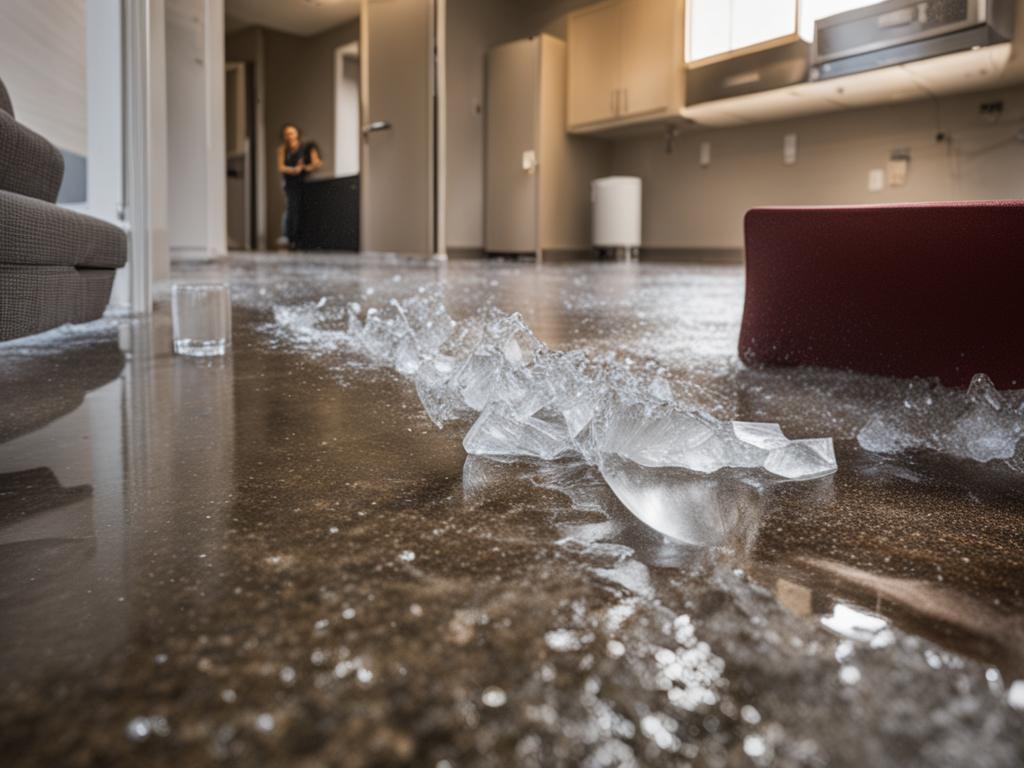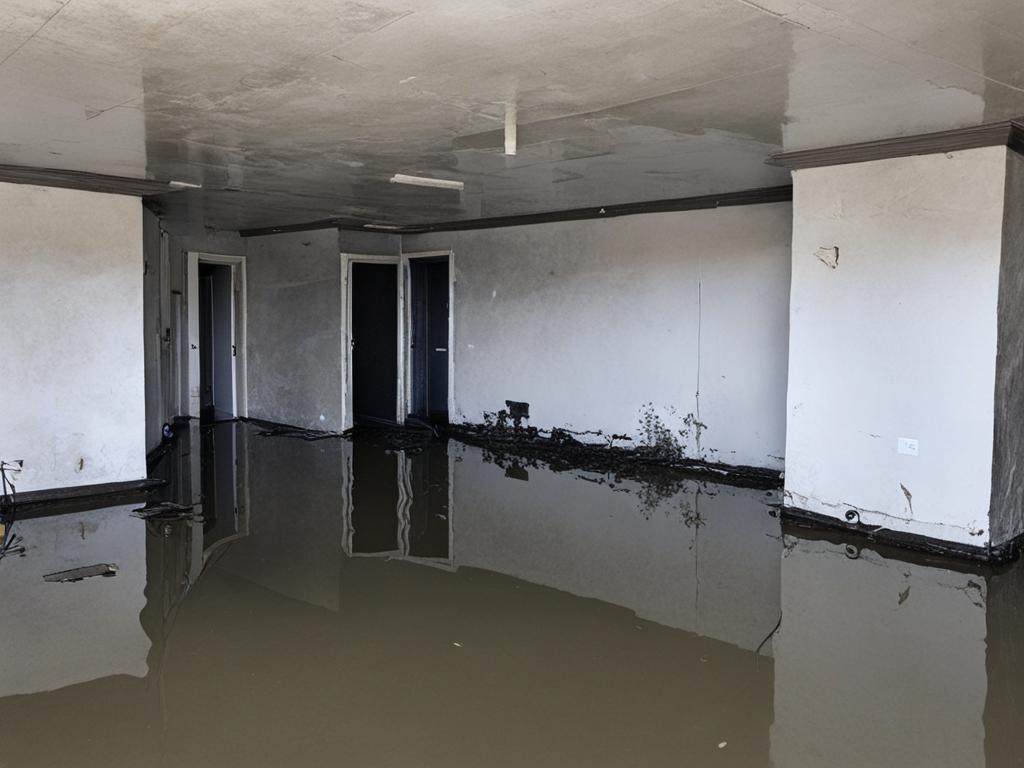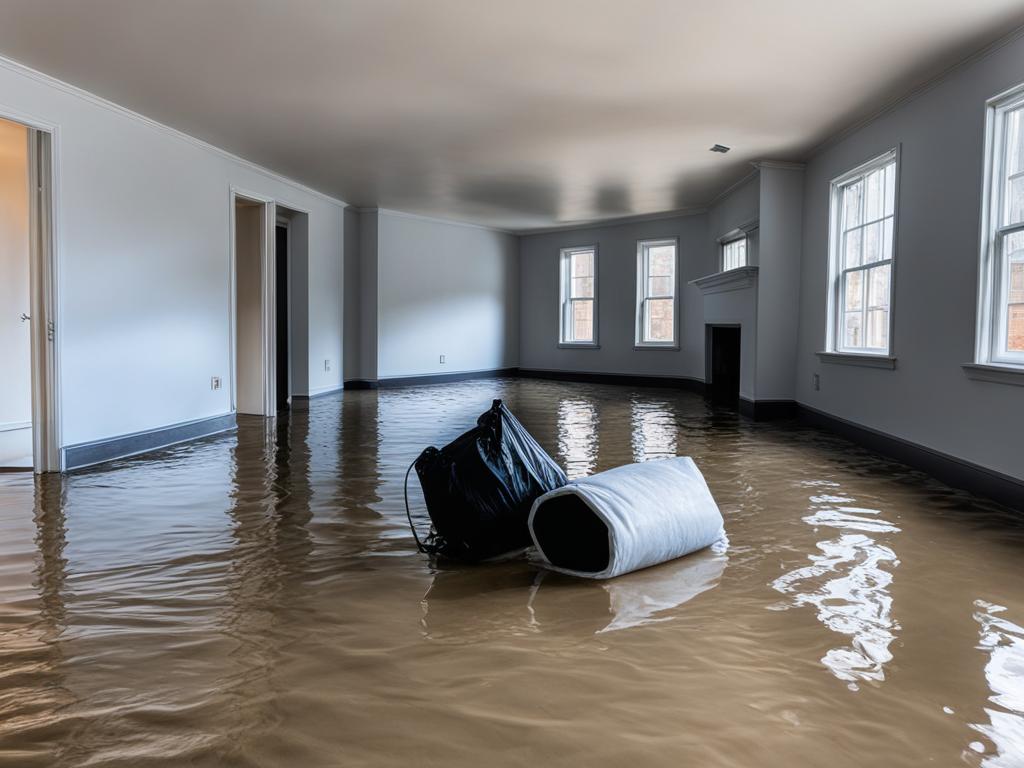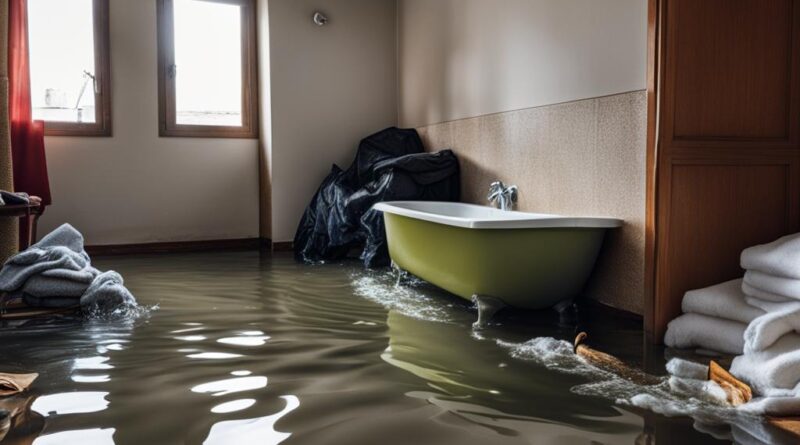Tenant Negligence: Prevent Water Damage Risks
Water damage is a significant concern for landlords. It can result in costly repairs and disrupt the rental business. While natural disasters and accidents can cause water damage, tenant negligence is also a common issue that landlords must address. Understanding landlord liability and the importance of renter’s insurance can help protect your rental property from water damage risks.
Key Takeaways:
- Tenant negligence can contribute to water damage risks in rental properties.
- Landlords should be aware of their liability and consider the importance of renter’s insurance.
- Water damage can occur due to various causes, including natural disasters, accidents, and tenant negligence.
- Landlord insurance coverage for water damage varies, and it’s essential to understand the policy’s limitations.
- Tenants are generally responsible for water damage caused by their negligence, but specific rules and regulations apply.
What Qualifies as Water Damage?
Water damage is a common issue faced by landlords, and it refers to any physical damage caused by water or moisture to a rental property. Understanding what qualifies as water damage is essential for landlords to effectively manage their properties and handle repair costs.
Water damage can occur due to a variety of reasons, including:
- Natural disasters such as floods or ice storms
- Accidents like bursting pipes or sewer backups
- Tenant negligence or misuse of fixtures and appliances
It is important for landlords to be aware of these different causes of water damage to take appropriate preventive measures and mitigate potential risks. Failure to address water damage promptly can result in costly repairs and further deterioration of the property.
“Water damage can have devastating effects on a rental property if not addressed promptly. It is crucial for landlords to understand the various causes of water damage and take preventive measures to protect their investment.”
Costs Associated with Water Damage
The costs associated with water damage can vary depending on the extent of the damage and the required repairs. Common expenses related to water damage may include:
- Repairing structural damage
- Replacing damaged flooring, walls, or ceilings
- Addressing mold and mildew issues
- Repairing or replacing damaged plumbing fixtures and systems
Additionally, there may be indirect costs such as temporary relocation expenses for tenants during repairs and potential loss of rental income while the property is uninhabitable.
By understanding the causes and potential costs associated with water damage, landlords can take proactive steps to prevent it and minimize the financial impact on their rental properties.
Landlord Insurance Coverage for Water Damage
When it comes to protecting your rental property from water damage, having the right landlord insurance coverage is essential. Understanding the details of your policy can help you make informed decisions and ensure you’re adequately protected.
Landlord insurance policies typically provide coverage for repairs resulting from sudden and accidental events, such as pipe bursts or water leaks. These types of incidents are often covered under your standard policy and can help mitigate the financial burden associated with repairs.
However, it’s important to note that some policies may have limitations on coverage for mold-related repairs, as mold is often seen as a secondary issue resulting from prolonged water damage. These limitations may vary from one insurance provider to another, so it’s crucial to review your policy and consult with your insurance agent to understand the extent of your coverage.
Another aspect to consider is whether your policy includes protection against tenant negligence and intentional acts. While tenant negligence can be a significant cause of water damage, not all policies may provide coverage for repairs resulting from tenant-related issues. Some insurance providers offer additional riders or endorsements that can be added to your policy to enhance coverage in these specific situations.
It’s essential to thoroughly review your landlord insurance policy and discuss any concerns or questions with your insurance agent. Understanding the limitations and inclusions of your policy will ensure you have the right coverage in place to protect your property.
Summary of Landlord Insurance Coverage for Water Damage:
| Policy Coverage | Details |
|---|---|
| Repairs for sudden and accidental events | Typically covered by most landlord insurance policies |
| Mold-related repairs | May have limitations on coverage, varying by insurance provider |
| Tenant negligence and intentional acts | Additional riders or endorsements may be available to enhance coverage |
By understanding the specific coverage provided by your landlord insurance policy, you can better protect your investment and be prepared for any situation that may arise. Regularly reviewing your policy and discussing your needs with your insurance agent will ensure you have the appropriate level of coverage in place to address water damage caused by tenant negligence or other incidents.

When Is the Tenant Responsible for Water Damage?
As a landlord, it is important to understand the tenant’s responsibility when it comes to water damage in a rental property. In most cases, tenants are held accountable for any water damage they cause due to their negligence.
Examples of tenant negligence that may result in water damage include:
- Failure to report leaks or plumbing issues
- Improper use of fixtures and appliances
- Leaving windows or doors open during rainstorms
When tenants neglect their duty to care for the property, it can lead to significant water damage and costly repairs. It is crucial for landlords to educate their tenants about the importance of promptly reporting any issues and using the property responsibly.
Landlords should familiarize themselves with the rules and regulations regarding the use of security deposits for damage repairs. In many cases, landlords may deduct the cost of repairs for tenant-caused water damage from the security deposit.
State-Specific Landlord-Tenant Laws
It is also crucial to be aware of state-specific landlord-tenant laws that dictate the responsibilities of both parties regarding water damage. These laws may outline specific obligations, such as providing tenants with information on reporting maintenance issues or conducting regular inspections to identify potential water damage risks.
Knowing and understanding the relevant laws will help landlords navigate tenant responsibilities and protect their property from water damage.
Table: Tenant Responsibilities for Water Damage
| Tenant Responsibility | Description |
|---|---|
| Reporting leaks and plumbing issues promptly | Tenants should notify the landlord immediately if they observe any signs of leaks or plumbing problems. |
| Using fixtures and appliances responsibly | Tenants should use fixtures and appliances correctly to avoid potential water damage. |
| Maintaining property ventilation | Tenants should ensure proper ventilation by closing windows and doors during inclement weather. |
When Is the Landlord Responsible for Water Damage?
As a landlord, it is your responsibility to provide safe and sanitary housing for your tenants. This includes preventing and addressing water damage in your rental property. However, there are certain situations where you may be held accountable for water damage that occurs on your property.
If the water damage is caused by a defect in the property, such as a faulty plumbing system or a leaking roof, the responsibility falls on your shoulders. It is crucial to have regular maintenance checks and inspections to identify and address any potential issues before they escalate into significant water damage incidents.
Additionally, if the water damage is a result of your negligence as a landlord, you may be held liable. Negligence can include failing to address reported leaks or ignoring signs of water damage. Open communication with your tenants is vital to ensuring prompt action and preventing further damage. By prioritizing regular maintenance, inspections, and open communication, you can mitigate the risk of extensive water damage and the associated repair costs.
“A stitch in time saves nine.”
By taking proactive measures to prevent water damage, you can save yourself from expensive repair bills later on. Regular maintenance, inspections, and open communication with your tenants are crucial in minimizing risks and ensuring the long-term safety and value of your rental property.
The Landlord’s Responsibility and Repair Costs
When water damage occurs due to a defect or negligence on the part of the landlord, it is essential to address the issue promptly. Failure to do so can result in further property damage and potential legal consequences.
To avoid costly repair bills and potential legal disputes, landlords should have proper insurance coverage that includes water damage. This can help alleviate some of the financial burden associated with repairs and replacements caused by water damage incidents. Landlord insurance policies vary, so it’s important to review your policy and ensure it adequately covers water damage and related expenses.
If you find yourself facing water damage repairs as a landlord, it’s vital to document the damage thoroughly and keep records of all communication with tenants and contractors. This documentation will be valuable in determining responsibility and justifying repair costs.
Remember, as a landlord, addressing water damage promptly and taking proactive measures to prevent it not only protects your investment but also ensures the well-being of your tenants. By fulfilling your responsibilities, you can maintain a positive landlord-tenant relationship and minimize the financial and legal risks associated with water damage incidents.

Minimizing Water Damage in Rental Properties
As a landlord, it’s crucial to take proactive measures to minimize the risk of water damage in your rental properties. By implementing these preventive steps, you can ensure the long-term integrity of your property and maintain a positive landlord-tenant relationship.
Regular Inspections and Maintenance
Performing regular inspections of plumbing fixtures and systems is vital in identifying potential issues before they escalate into major water damage problems. Schedule routine maintenance checks to detect leaks, drips, or other signs of water intrusion. Addressing these issues promptly can prevent extensive damage and costly repairs.
Proper Drainage and Waterproofing
Ensure that your property has proper drainage systems in place to divert water away from the building. Clear gutters and downspouts regularly to prevent water pooling and potential leaks. Consider waterproofing basements or crawl spaces to protect against groundwater seepage.
Installation of Shut-Off Valves and Alarm Systems
Installing shut-off valves for individual fixtures, such as toilets and sinks, can help minimize water damage in case of leaks or pipe bursts. Additionally, investing in water alarm systems can provide early detection of leaks, allowing for immediate action to mitigate further damage.
Insulation of Exposed Pipes
Insulate exposed pipes, especially those in unheated areas, to prevent freezing and potential bursts during colder months. Adequate insulation can help maintain consistent water flow and minimize the risk of significant water damage.
Tenant Education on Water Damage Prevention
Educating your tenants about the importance of water damage prevention can go a long way in avoiding potential issues. Provide them with information on how to identify and report leaks, proper usage of plumbing fixtures, and steps to take in case of an emergency. Encourage them to report any signs of water damage promptly to enable timely repairs.
By incorporating these proactive measures into your rental property management strategies, you can significantly reduce the risk of water damage and the associated costs. Regular inspections, proper maintenance, and tenant education form the foundation of a comprehensive water damage prevention plan.

Remember, a little proactive effort can save you from major headaches down the line. By investing time and resources into water damage prevention, you’ll protect your property, maintain the value of your investment, and foster a healthy and mutually beneficial relationship with your tenants.
Conclusion
As a landlord, it is crucial to be proactive in preventing and addressing water damage in your rental properties. Understanding your landlord insurance coverage is the first step towards protecting your investment. Be familiar with the policy terms and inquire if it provides sufficient protection against water damage caused by tenant negligence or intentional acts.
In addition to insurance coverage, you should be aware of when tenants are responsible for water damage. Most cases of water damage are a result of tenant negligence, such as failing to report leaks or improper use of fixtures. Knowing your rights and responsibilities, as well as state-specific landlord-tenant laws, will help you navigate these situations effectively and minimize repair costs.
Maintenance plays a vital role in preventing water damage. Prioritize regular inspections of plumbing fixtures, drainage systems, and the property’s overall condition. By identifying potential issues early on, you can address them promptly and prevent extensive damage. Open communication with tenants is crucial in ensuring that they understand their role in reporting any water-related concerns promptly.
Lastly, education is key. Providing tenants with information on water damage prevention can empower them to take proactive measures and reduce the risk of incidents. Educate them on how to identify signs of water damage, the proper use of appliances, and the importance of reporting any issues promptly. By working together and implementing these proactive measures, you can protect your rental properties from water damage and maintain a mutually beneficial landlord-tenant relationship.
FAQ
What qualifies as water damage?
Water damage refers to any physical damage to a rental property caused by water or moisture. This can occur due to natural disasters like floods or ice storms, accidents such as bursting pipes or sewer backups, or negligence by tenants.
What does landlord insurance cover for water damage?
Landlord insurance coverage for water damage varies depending on the policy. Most policies will cover repairs for sudden and accidental events like pipe bursts, but may have limitations on coverage for mold-related repairs.
When is the tenant responsible for water damage?
In most cases, tenants are responsible for any water damage they cause due to their negligence. This includes situations where they fail to report leaks or use fixtures and appliances improperly.
When is the landlord responsible for water damage?
Landlords are responsible for providing safe and sanitary housing, which includes preventing and addressing water damage. If water damage occurs due to a defect in the property or the landlord’s negligence, they may be liable for repairs and replacement items.
How can landlords minimize water damage in rental properties?
Landlords can take proactive steps to minimize the risk of water damage in their rental properties. This includes regular inspections of plumbing fixtures, proper drainage, checking for signs of water intrusion, installing shut-off valves and alarm systems, insulating exposed pipes, and educating tenants about identifying potential signs of water damage.

